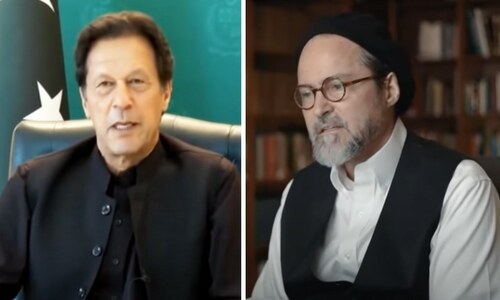A number of eminent Muslim scholars on Sunday stressed the need to tackle issues emanating from globalisation and a plethora of untamed information on the internet through proper guidance of the youth.
In the second part of the dialogue with Prime Minister Imran Khan held by the National Rehmatul-lil-Aalameen Authority under the theme 'Islam, Society and Ethical Revival', the scholars highlighted certain collective efforts by Muslim countries to address the negative impacts of modernity on the Muslim youth.
The globally acknowledged speakers included Sheikh Abdullah bin Bayyah, Dr Timothy Winter/Abdal Hakim Murad, Dr Seyyed Hossein Nasr, Dr Recep Senturk, Dr Osman Bakar, Shaykh Hamza Yusuf and Dr Chandra Muzaffar.
They responded to various questions raised by the premier about the negative influences of social media, corruption, rising sexual crimes against women and children and other contemporary challenges faced by the Muslim youth and society.
Taking part in the discussion, Dr Nasr, a professor of Islamic studies in the US, spoke about the impacts of the negative modern trends on Muslim children that he said could be observed more than ever. He underscored the need to guide the youth through teachings that were authentic and relevant to the modern-day challenges.
He said Muslim countries were blessed with tremendous resources that they could utilise to revive and preserve their culture.
Analyse: The pitfalls of ideology
Shaykh Hamza Yusuf, an American scholar, while responding to Prime Minister Imran's query about endemic corruption and increasing sex crimes against women and children, attributed these profound problems to "perverted appetite" among people.
The prime minister noted that sexual crimes had increased sharply and corruption had become deep-rooted, and these issues were not limited to Pakistan. He stressed that a society had to take stand against everyday corruption, making it unacceptable.
Dr Yusuf likened the menace of corruption to a rotten apple which could decay a society.
He said Islam had tasked men with taking care of women and children, adding that Muslim young men should be taught to honour women.
English academic and scholar Dr Murad observed that the easy availability of harmful information on mobile phones for the young generations was a real challenge for most societies across the globe.
He said modernity had led to the emergence of many issues and the crisis was ever-escalating. He also referred to the Me Too movement against sexual abuse launched in the US which he said reflected social change.
Dr Senturk, a Turkish academic and president USUL Academy, Turkey, while sharing his views said that in the face of global problems, Muslim youth should be advised to adopt ethics derived from the Sunnah of the Holy Prophet (PBUH).
Malaysian sociologist and thinker Dr Muzaffar suggested holding conferences featuring Muslim youngsters so that they could speak their minds and articulate their position on contemporary challenges and their solutions.
People across the world should realise that all burning issues in today's world are shared challenges to which Islam had provided solutions centuries ago, he said.
Sheikh Abdullah bin Bayyah, chairman of the Fatwa Council UAE, said the current age was one of globalisation and "invasion of social media, internet and other things" which had been leaving lasting impact upon the youth.
He also underlined the need for establishment of a university for Muslim youth that could focus on teaching morals and ethics.
Prime Minister Imran, meanwhile, hinted that he would be holding similar dialogues with the scholars in the future so as to get their views about contemporary issues.
He said his idea behind the establishment of the Rehmatul-lil-Aalameen Authority was to unite people under the teachings of Seerah and raise standards of morality in the society.















































